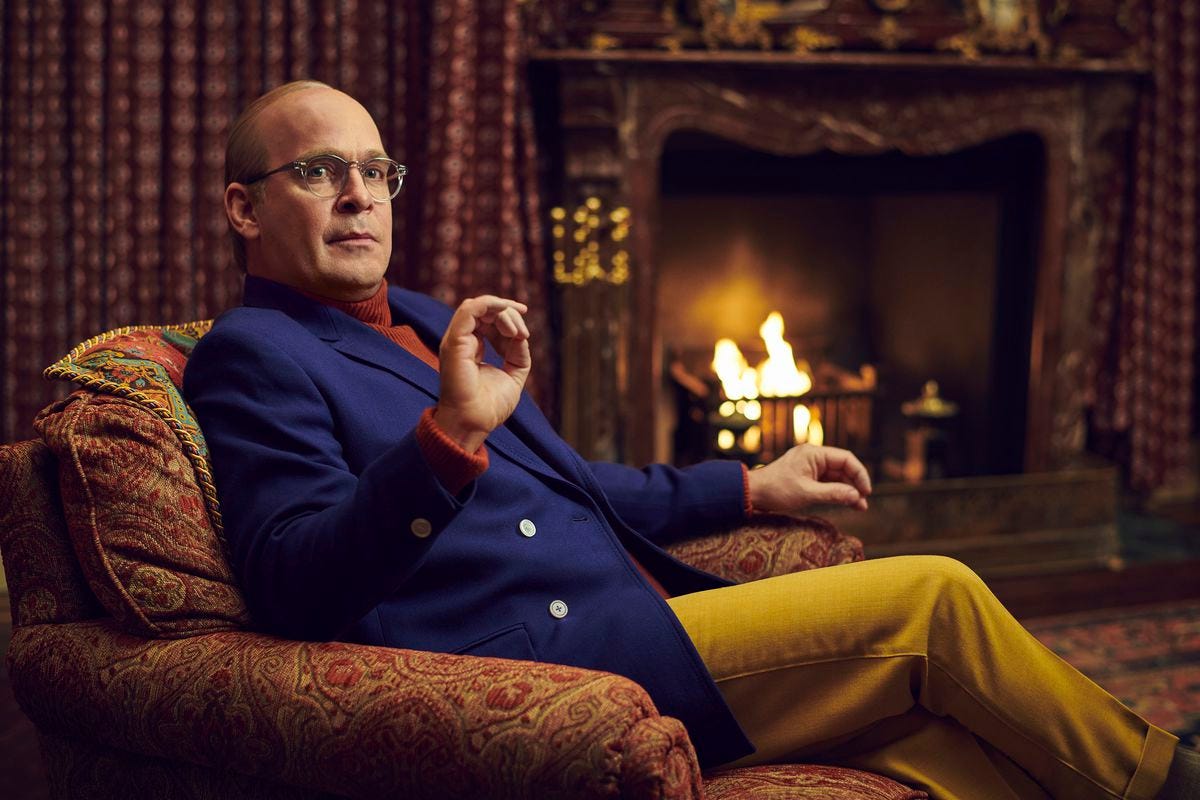Unanswered Prayers: Truman's Story and 'Feud: Capote vs. The Swans'
It's a story that's still being written.
“Truman’s secret is seduction.”
“No, it’s memory.” (Feud: Capote vs. The Swans)
With the premiere of the latest season of FX’s Feud: Capote vs. The Swans last week, Truman Capote and his great decline from literary lightning rod to cautionary tale has reemerged for examination. The series follows a late-career Capote as he struggles to remain relevant against the pull of his addiction to drugs and alcohol, and his increasingly self-destructive behavior which culminates in the 1975 publication of “La Cote Basque 1965” in Esquire; in which he aired the thinly veiled dirty laundry of New York’s elite.
The Ryan Murphy-produced, Jon Robin Baitz-penned, and Gus Van Sant-directed limited series boasts an all-star cast and lavish production budget. The first episode shows a tortured and perpetually drunk Capote grasping for something to write about. It’s been years since his last novel, and he can feel his gifts slipping away. Capote turns his exacting and often venomous gaze on the women he spent years ingratiating himself with. They were some of the wealthiest and most powerful women in the country, and considered him a close friend.
So why did he turn on them? Had he tired of playing the sycophant? Grown resentful of their elitist and frivolous lives tinged with gossip and boredom? Did his latent misogyny drive him to reject the very women who had welcomed him? Was he attempting to condemn the social class they belonged to and protected, or simply reaching for the lowest hanging fruit available in an attempt to resuscitate his writing career? My interest in the new series prompted me to take a closer look at Capote’s life and career, and the ways his life and choices illuminate the distance between who we make ourselves to be and who we cannot help but become.
Controversial, ubiquitous, and magnetic, Capote was a preeminent writer of his generation with a lasting legacy, notably for being one of the only openly gay public figures of the time. His greatest work of art was the version of himself that he presented to the world. But like any celebrity, his persona was a carefully constructed amalgamation of truth and fiction. And this approach to his life transferred to his craft as well. Even his most famous work, 1966’s In Cold Blood, which he described as the first “nonfiction novel” thrived in the public imagination by blurring the line between fact and legend.
A painful childhood of rejection and abandonment was followed by a glamorous adolescence in New York that was as short-lived as it was seductive. Capote spent his adult life chasing the attention of the limelight, running from the person he was and toward the man he wanted to be. A quiet and observant child morphed into a vibrant writer on the brink of infamy. Photographed for the cover of his first novel Other Voices, Other Rooms in 1948, he leers at the camera coquettishly, as if flaunting the qualities he possessed that had previously been scorned. The photo, and the novel it advertised, were considered scandalous and made him instantly famous, though not nearly as famous as he was to become. He was open (as much as was possible at the time) about his sexuality and attraction to other men. Yet he didn’t align himself with the gay community politically. I would argue that he perhaps felt there was no point in hiding the fact that he was gay, and saw no point in dwelling on it either.
This essential conundrum gets at the heart of what makes Capote such a fascinating subject - and such a tragic one. For all his talent, success and adoration, he refused to embrace those who would embrace him. He grew up feeling like an outsider. First as a peculiar and effeminate boy in rural Alabama, then as the brilliant upstart bringing fresh new voice to a new generation of writers, then as the established curiosity beloved by all but known by few, he thrived only at arm’s length. A lifetime on the outside looking in instilled a lifelong fear of being forgotten that he never seemed to shake, a fear that he eventually manifested for himself. It’s easier to push others away and embrace the resulting loneliness than endure the disappointment of being left behind.
Ultimately, his pain and vanity consumed him, and prevented him from finishing Answered Prayers, the book that “La Cote Basque 1965” was meant to be the beginning of. After a lifetime of chasing fame and literary excellence, he failed at the very thing that made him who he was. In Cold Blood was the last book he ever wrote. To me, what’s more tragic than his betrayal of his friends is his betrayal of his talent. Though battling severe addiction issues that obviously robbed him of his ability to work, his devotion to his own narrative superseded any final attempts to create a new one.
But despite his tragic end, his legacy as a writer stands on its own. Even his dedication to self-destructive behavior could not erase his impact on our culture, or his contributions to it. He was a flawed, selfish and self-serving man with an immense talent and great capacity for insight and compassion. If the new series illustrates anything it's that Truman Capote’s story is still being written. Despite his best efforts, and all the words he shared with us, his were never going to be the last. And maybe that’s for the best. He absolutely would not agree with me, but I think his life shows that we’re not always the best stewards of our own stories - here’s hoping the forthcoming season gets his right.





